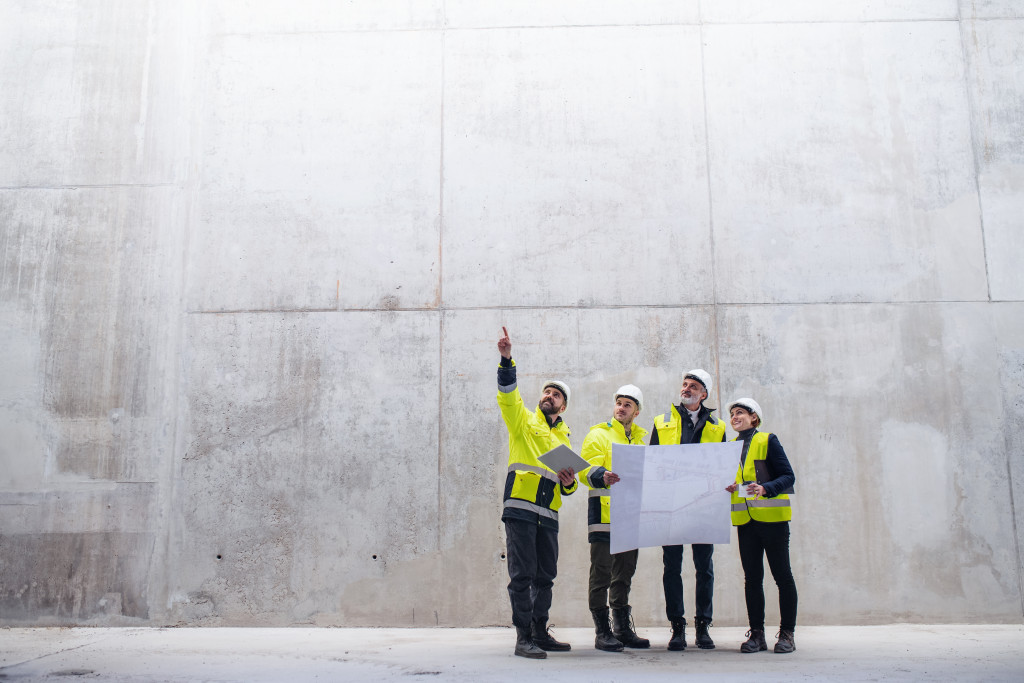- Certifications improve construction workers’ skills, making them attractive to potential employers.
- Competitive packages, including fair salaries, health insurance, and retirement plans, attract and retain quality workers.
- Investing in continuous training and development fosters workers’ career growth and commitment to the firm.
- High-quality safety measures protect workers, increase productivity, boost morale, and reduce insurance costs.
Construction workers form the backbone of the construction industry, playing pivotal roles from the initial stages of planning to the final stages of project execution. Their vast array of skills and expertise ensures the successful completion of construction projects, whether small residential buildings or colossal infrastructure projects. The construction industry employed around 2.69 million construction workers in the UK as of 2022, attesting to these professionals’ crucial role. Moreover, the sector is projected to grow by 5% in 2029, faster than the average for all occupations, indicating an increasing demand for skilled construction workers.
As a result, construction firms must find ways to attract and retain the best talent. Here are a few tips to ensure construction firms can get access to quality workers:
Provide Access to Certifications

Certifications are vital in the construction industry as they demonstrate a worker’s proficiency and commitment to maintaining high industry standards. These recognitions enhance workers’ skills and make them more attractive to potential employers.
For instance, a worker with a certification in Construction Health and Safety (CHAS) assures employers of their understanding of necessary safety protocols, making them a valuable asset in minimizing workplace accidents. Similarly, an NVQ (National Vocational Qualification) in Construction Operations and Civil Engineering Services can signify a worker’s ability to efficiently oversee and manage construction operations.
A CSCS (Construction Skills Certification Scheme) card is also essential for anyone in the UK construction industry. It proves that the worker has the required training and qualifications for the type of work they do.
Workers can get capabilities for specific construction tasks, further improving their value. Bricklaying is one of the most in-demand construction specializations. If possible, provide workers with a way to access educational resources to prepare them for the test. Investing in your knowledge will be vital for construction workers to qualify for the certification. You can get your CSCS bricklayer card today with the right resources and guidance.
Offer Competitive Package
A competitive salary and benefits package attracts high-quality workers and encourages them to stay with your construction firm for the long haul. Here are some critical elements of a competitive package:
Competitive Salary
Offering a competitive salary shows your recognition of a worker’s skills and contribution to the organization. It makes your firm an attractive option for top talent, ensuring you have a pool of highly skilled workers.
Health Insurance
Health insurance is a crucial benefit for construction workers, given the physically demanding nature of their job. Providing comprehensive health insurance, which could cover medical, dental, and vision care, manifests your firm’s commitment to the well-being of its employees.
Retirement Plans
Retirement plans assure workers of their financial future and foster loyalty to your firm. Workers are more likely to stay with an employer who contributes to their retirement fund, reducing turnover and ensuring the retention of skilled workers.
Continuous Training and Development
Investing in continuous training and development shows workers that you’re interested in their career growth and advancement. This could involve providing access to professional development courses or sponsoring further education. In a constantly evolving industry, continuous learning opportunities are highly valued by workers.
Ensure High-Quality Safety

Safety measures and the assurance of well-being are paramount in construction workplaces, often riddled with potential hazards. High-quality safety standards serve not only to safeguard the health and lives of construction workers but also to boost morale, increase productivity, and lower insurance premiums — ultimately contributing to a firm’s bottom line.
Construction firms can assure high-quality safety in several ways. Firstly, it is essential to comply with all relevant regulations and guidelines, such as those laid out by the Health and Safety Executive in the UK. Compliance ensures the basic safety standards are met and can prevent negligence-related legal issues.
Secondly, firms should invest in regular safety training for their workers. This training should cover correct equipment usage, hazard recognition, emergency procedures, and first aid. Regular toolbox talks are also an effective way to reinforce safety messages and update workers about safety procedures.
Thirdly, providing appropriate personal protective equipment (PPE) can significantly reduce the risk of injury. Helmets, safety glasses, high-visibility clothing, and protective footwear are examples of PPE that could be provided.
Lastly, fostering an open culture where workers feel comfortable reporting potential hazards or unsafe behaviors can help identify and rectify issues quickly. Encouraging such a culture promotes proactive safety measures, ensuring that all workers feel responsible for maintaining a safe work environment.
Final Thoughts
High-quality workers are the lifeblood of construction firms. Here, we discussed some tips to ensure construction firms can get access to quality workers, including offering competitive packages and emphasizing safety standards. To achieve success in the industry, firms must prioritize worker satisfaction and retention — only then can they reap the rewards of having skilled professionals in their workforce.
